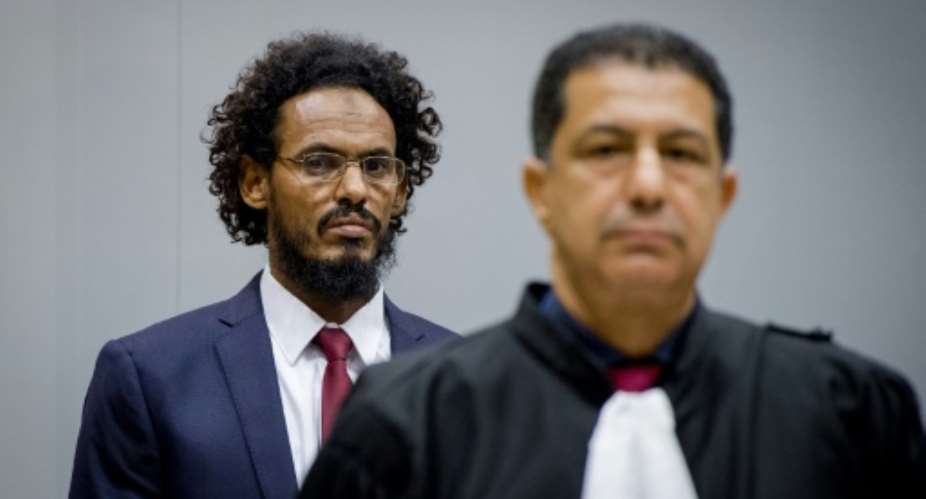The Hague (AFP) - An alleged Al-Qaeda-linked Islamist militant accused of ordering the destruction of treasured monuments in Mali's fabled city of Timbuktu faced International Criminal Court judges for the first time on Wednesday.
The case is the first to be brought by the world's only permanent war crimes court over the extremist violence that rocked Mali in 2012 and 2013.
Ahmad al-Faqi al-Mahdi appeared in the dock at the tribunal in The Hague after being handed over by authorities in Mali's neighbour Niger on Saturday.
Wearing a dark suit, white shirt and red tie, Faqi told judges he wished to be addressed in Arabic and to be referred to by his full name.
"My name is Ahmad al-Faqi al-Mahdi, I am from the Al-Ansar Touareg tribe," said Faqi, sporting a sparse beard and wearing a pair of glasses.
He declined to make any other statement, saying he wanted to first consult his lawyers.
- Desert heritage site -
Faqi, a Tuareg leader also known as Abu Tourab, is accused of war crimes over the deliberate destruction of buildings at a UNESCO-listed desert heritage site in 2012.
Nicknamed the "City of 333 Saints", Timbuktu, which is located around 1,000 kilometres (600 miles) northeast of Mali's capital Bamako, was overrun by Al Qaeda-affiliated jihadists in the spring of 2012.
In June of that year, the militants destroyed more than a dozen of the city's mausoleums dating back to its golden age as an economic, intellectual and spiritual centre in the 15th and 16th centuries.
Faqi was a leader of Ansar Dine, a mainly Tuareg group which held sway over Mali's desert north, together with Al-Qaeda in the Islamic Maghreb (AQIM) and a third local group, until being routed in a French-led intervention in January 2013.
- 'Step against impunity' -
Judge Cuno Tarfusser informed Faqi of the charges against him after verifying his identity and the language in which he is able to follow the proceedings.
The judge set January 18 next year as the date for a hearing to determine whether Faqi will face trial.
Born in Agoune, 100 kilometres west of Timbuktu, Faqi is described by the ICC as having been "an active personality in the context of the occupation of Timbuktu" as the alleged leader of the "Hesbah" anti-vice squad.
A member of an Islamic court set up by the jihadists to enforce strict sharia law, he is alleged to have jointly ordered or carried out the destruction of nine mausoleums and Timbuktu's famous Sidi Yahia mosque.
In 2014 the UN cultural body UNESCO began rebuilding Timbuktu with the Malian government and other international organisations after a 2013 French-led military operation drove the jihadists out of the city.
The 10 million euro ($11 million) reconstruction project relies heavily on traditional building methods and local cultural knowledge.
The mausoleums were constructed to pay homage to deceased saints but were considered blasphemous by the jihadists.
Around 4,000 ancient manuscripts were also lost, stolen or burned during the Islamists' reign of terror.
In January 2013, ICC chief prosecutor Fatou Bensouda launched an investigation into alleged war crimes in Mali.
Bensouda called Faqi's arrest an "important step forward in the fight against impunity, not only in Mali but also the broader Sahel and Sahara region in Africa, whose populations have been in recent years subjected to unspeakable crimes."
Details of Faqi's actual arrest by Niger authorities remain unclear.





 We’ll protect state wealth from opaque deals – Prof Jane Naana
We’ll protect state wealth from opaque deals – Prof Jane Naana
 Mauritania president says running for second term in June polls
Mauritania president says running for second term in June polls
 I won't ever say I was a mere driver’s mate' — Prof. Opoku-Agyemang
I won't ever say I was a mere driver’s mate' — Prof. Opoku-Agyemang
 2024 polls: 'EC struggling to defend credibility'— Prof. Opoku-Agyemang
2024 polls: 'EC struggling to defend credibility'— Prof. Opoku-Agyemang
 Akufo-Addo gov't's 'greed, unbridled arrogance, unrestrained impunity, sheer dis...
Akufo-Addo gov't's 'greed, unbridled arrogance, unrestrained impunity, sheer dis...
 Election 2024: Ghana needs an urgent reset, a leadership that is inspiring – Ma...
Election 2024: Ghana needs an urgent reset, a leadership that is inspiring – Ma...
 Partner NDC to rollout a future of limitless prospects – Prof Jane Naana Opoku-A...
Partner NDC to rollout a future of limitless prospects – Prof Jane Naana Opoku-A...
 NPP will remain in gov’t till Jesus comes — Diana Asamoah
NPP will remain in gov’t till Jesus comes — Diana Asamoah
 Sunyani Technical University demands apology from former SRC president over sex-...
Sunyani Technical University demands apology from former SRC president over sex-...
 'Dumsor' was resolved by Mahama but ‘incompetent' Akufo-Addo has destroyed the g...
'Dumsor' was resolved by Mahama but ‘incompetent' Akufo-Addo has destroyed the g...
